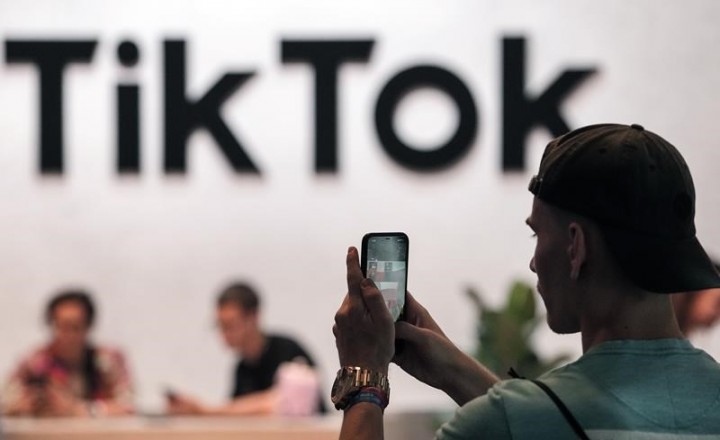Media
YouTube, TikTok say Liberal online streaming bill fails to protect digital creators

OTTAWA — Online streaming giants YouTube and TikTok are asking Canadian senators to take a sober second look at an online streaming bill that they say would cause significant harm to Canadian digital creators.
TikTok executive Steve de Eyre said in a Senate committee meeting on Wednesday evening that the federal Liberals’ Bill C-11 doesn’t just fail to protect digital creators from regulation, but makes them collateral damage.
He said the Senate should more explicitly exclude user-generated content from the bill, which was designed to modernize Canadian broadcasting legislation and bring online streaming platforms into the fold.
Senators should also consider rules around how Canadian content is identified, he said, saying much of the content that Canadians create on TikTok wouldn’t qualify as such.
The onus could end up on users to prove how Canadian they are, meaning that “established media voices and cultural voices” with more resources could end up at the front of the line, said de Eyre, who is the company’s director of public policy and government affairs in Canada.
YouTube executive Jeanette Patell told senators that the bill gives far too much discretion to Canada’s broadcasting regulators to make demands around user-generated content.
She said the provision that the regulator can consider whether someone has directly or indirectly generated revenue from the content would affect “effectively everything” on the platform.
“This is a global precedent,” said Patell, who is YouTube’s head of government affairs and public policy.
She warned that if other countries follow suit, Canadian creators, for whom 90 per cent of YouTube views come from outside the country, will have a harder time getting noticed.
“There’s nothing like this in the world for open platforms. It really puts the international audiences of creators at risk.”
Patell also warned that the regulator could require changes to the company’s algorithms, echoing concerns that music streaming giant Spotify raised during a hearing last week.
That fear is based on committee testimony from Ian Scott, the chairman of the Canadian Radio-television and Telecommunications Commission.
Scott told senators in June that the regulator could ask platforms such as YouTube to “manipulate” their algorithms to produce particular outcomes.
At a meeting last week, Spotify’s head of artist and label partnerships for Canada, Nathan Wiszniak, said that affecting the way the platform generates recommendations for individual listeners would go against its raison d’être and could create negative feedback for the songs that are being recommended.
“Asking services to repeatedly bias recommendations against listener preferences strikes at the core trust we have built with our customers,” he said.
Some Quebec senators pushed back on the idea that requiring an algorithm to nudge users towards Canadian content is such a bad thing.
Sen. Julie Miville-Dechêne said that the bill requires companies to choose the means to make Canadian artists discoverable.
“Do you have means other than an algorithm to promote Canadian content?” she asked Patell in English. “Why are you afraid?”
Sen. René Cormier, for his part, noticed during his own use of YouTube that the algorithm was recommending anglophone music to listen to after Quebec artist Ariane Moffatt, whom he repeatedly name-dropped.
“I’m trying to understand why you can’t continue with the same type of music that I’m already listening to,” he said in French. “Why am I led elsewhere in the recommendations?”
Patell said YouTube is about “You,” and that its users train the algorithm to serve their needs — so she recommended that Cormier “teach” the platform what he’s looking for. When Canadians come looking for Canadian content, she said, “we absolutely want to serve that to them.”
Though de Eyre said that TikTok is “democratizing discoverability,” Bernadette Clement, a senator from Ontario, pointed out that “it’s not democratic if people don’t know how algorithms work.”
Patell and de Eyre responded by saying that their companies are making their source code and raw data available to researchers.
The streaming companies are recommending specific tweaks to the language of the bill that they say would assuage their concerns.
In June, before Parliament’s summer break, the House of Commons passed Bill C-11 with more than 150 amendments. The Senate decided not to rush its passage and instead to take a more thorough look this fall.
If senators decide to amend the bill, it would have to be sent back to the House of Commons for approval before it can become law.
This report by The Canadian Press was first published Sept. 21, 2022.
Marie-Danielle Smith, The Canadian Press
Media
Trump could cash out his DJT stock within weeks. Here’s what happens if he sells
Former President Donald Trump is on the brink of a significant financial decision that could have far-reaching implications for both his personal wealth and the future of his fledgling social media company, Trump Media & Technology Group (TMTG). As the lockup period on his shares in TMTG, which owns Truth Social, nears its end, Trump could soon be free to sell his substantial stake in the company. However, the potential payday, which makes up a large portion of his net worth, comes with considerable risks for Trump and his supporters.
Trump’s stake in TMTG comprises nearly 59% of the company, amounting to 114,750,000 shares. As of now, this holding is valued at approximately $2.6 billion. These shares are currently under a lockup agreement, a common feature of initial public offerings (IPOs), designed to prevent company insiders from immediately selling their shares and potentially destabilizing the stock. The lockup, which began after TMTG’s merger with a special purpose acquisition company (SPAC), is set to expire on September 25, though it could end earlier if certain conditions are met.
Should Trump decide to sell his shares after the lockup expires, the market could respond in unpredictable ways. The sale of a substantial number of shares by a major stakeholder like Trump could flood the market, potentially driving down the stock price. Daniel Bradley, a finance professor at the University of South Florida, suggests that the market might react negatively to such a large sale, particularly if there aren’t enough buyers to absorb the supply. This could lead to a sharp decline in the stock’s value, impacting both Trump’s personal wealth and the company’s market standing.
Moreover, Trump’s involvement in Truth Social has been a key driver of investor interest. The platform, marketed as a free speech alternative to mainstream social media, has attracted a loyal user base largely due to Trump’s presence. If Trump were to sell his stake, it might signal a lack of confidence in the company, potentially shaking investor confidence and further depressing the stock price.
Trump’s decision is also influenced by his ongoing legal battles, which have already cost him over $100 million in legal fees. Selling his shares could provide a significant financial boost, helping him cover these mounting expenses. However, this move could also have political ramifications, especially as he continues his bid for the Republican nomination in the 2024 presidential race.
Trump Media’s success is closely tied to Trump’s political fortunes. The company’s stock has shown volatility in response to developments in the presidential race, with Trump’s chances of winning having a direct impact on the stock’s value. If Trump sells his stake, it could be interpreted as a lack of confidence in his own political future, potentially undermining both his campaign and the company’s prospects.
Truth Social, the flagship product of TMTG, has faced challenges in generating traffic and advertising revenue, especially compared to established social media giants like X (formerly Twitter) and Facebook. Despite this, the company’s valuation has remained high, fueled by investor speculation on Trump’s political future. If Trump remains in the race and manages to secure the presidency, the value of his shares could increase. Conversely, any missteps on the campaign trail could have the opposite effect, further destabilizing the stock.
As the lockup period comes to an end, Trump faces a critical decision that could shape the future of both his personal finances and Truth Social. Whether he chooses to hold onto his shares or cash out, the outcome will likely have significant consequences for the company, its investors, and Trump’s political aspirations.

Media
Arizona man accused of social media threats to Trump is arrested

Cochise County, AZ — Law enforcement officials in Arizona have apprehended Ronald Lee Syvrud, a 66-year-old resident of Cochise County, after a manhunt was launched following alleged death threats he made against former President Donald Trump. The threats reportedly surfaced in social media posts over the past two weeks, as Trump visited the US-Mexico border in Cochise County on Thursday.
Syvrud, who hails from Benson, Arizona, located about 50 miles southeast of Tucson, was captured by the Cochise County Sheriff’s Office on Thursday afternoon. The Sheriff’s Office confirmed his arrest, stating, “This subject has been taken into custody without incident.”
In addition to the alleged threats against Trump, Syvrud is wanted for multiple offences, including failure to register as a sex offender. He also faces several warrants in both Wisconsin and Arizona, including charges for driving under the influence and a felony hit-and-run.
The timing of the arrest coincided with Trump’s visit to Cochise County, where he toured the US-Mexico border. During his visit, Trump addressed the ongoing border issues and criticized his political rival, Democratic presidential nominee Kamala Harris, for what he described as lax immigration policies. When asked by reporters about the ongoing manhunt for Syvrud, Trump responded, “No, I have not heard that, but I am not that surprised and the reason is because I want to do things that are very bad for the bad guys.”
This incident marks the latest in a series of threats against political figures during the current election cycle. Just earlier this month, a 66-year-old Virginia man was arrested on suspicion of making death threats against Vice President Kamala Harris and other public officials.
Media
Trump Media & Technology Group Faces Declining Stock Amid Financial Struggles and Increased Competition

Trump Media & Technology Group’s stock has taken a significant hit, dropping more than 11% this week following a disappointing earnings report and the return of former U.S. President Donald Trump to the rival social media platform X, formerly known as Twitter. This decline is part of a broader downward trend for the parent company of Truth Social, with the stock plummeting nearly 43% since mid-July. Despite the sharp decline, some investors remain unfazed, expressing continued optimism for the company’s financial future or standing by their investment as a show of political support for Trump.
One such investor, Todd Schlanger, an interior designer from West Palm Beach, explained his commitment to the stock, stating, “I’m a Republican, so I supported him. When I found out about the stock, I got involved because I support the company and believe in free speech.” Schlanger, who owns around 1,000 shares, is a regular user of Truth Social and is excited about the company’s future, particularly its plans to expand its streaming services. He believes Truth Social has the potential to be as strong as Facebook or X, despite the stock’s recent struggles.
However, Truth Social’s stock performance is deeply tied to Trump’s political influence and the company’s ability to generate sustainable revenue, which has proven challenging. An earnings report released last Friday showed the company lost over $16 million in the three-month period ending in June. Revenue dropped by 30%, down to approximately $836,000 compared to $1.2 million during the same period last year.
In response to the earnings report, Truth Social CEO Devin Nunes emphasized the company’s strong cash position, highlighting $344 million in cash reserves and no debt. He also reiterated the company’s commitment to free speech, stating, “From the beginning, it was our intention to make Truth Social an impenetrable beachhead of free speech, and by taking extraordinary steps to minimize our reliance on Big Tech, that is exactly what we are doing.”
Despite these assurances, investors reacted negatively to the quarterly report, leading to a steep drop in stock price. The situation was further complicated by Trump’s return to X, where he posted for the first time in a year. Trump’s exclusivity agreement with Trump Media & Technology Group mandates that he posts personal content first on Truth Social. However, he is allowed to make politically related posts on other social media platforms, which he did earlier this week, potentially drawing users away from Truth Social.
For investors like Teri Lynn Roberson, who purchased shares near the company’s peak after it went public in March, the decline in stock value has been disheartening. However, Roberson remains unbothered by the poor performance, saying her investment was more about supporting Trump than making money. “I’m way at a loss, but I am OK with that. I am just watching it for fun,” Roberson said, adding that she sees Trump’s return to X as a positive move that could expand his reach beyond Truth Social’s “echo chamber.”
The stock’s performance holds significant financial implications for Trump himself, as he owns a 65% stake in Trump Media & Technology Group. According to Fortune, this stake represents a substantial portion of his net worth, which could be vulnerable if the company continues to struggle financially.
Analysts have described Truth Social as a “meme stock,” similar to companies like GameStop and AMC that saw their stock prices driven by ideological investments rather than business fundamentals. Tyler Richey, an analyst at Sevens Report Research, noted that the stock has ebbed and flowed based on sentiment toward Trump. He pointed out that the recent decline coincided with the rise of U.S. Vice President Kamala Harris as the Democratic presidential nominee, which may have dampened perceptions of Trump’s 2024 election prospects.
Jay Ritter, a finance professor at the University of Florida, offered a grim long-term outlook for Truth Social, suggesting that the stock would likely remain volatile, but with an overall downward trend. “What’s lacking for the true believer in the company story is, ‘OK, where is the business strategy that will be generating revenue?'” Ritter said, highlighting the company’s struggle to produce a sustainable business model.
Still, for some investors, like Michael Rogers, a masonry company owner in North Carolina, their support for Trump Media & Technology Group is unwavering. Rogers, who owns over 10,000 shares, said he invested in the company both as a show of support for Trump and because of his belief in the company’s financial future. Despite concerns about the company’s revenue challenges, Rogers expressed confidence in the business, stating, “I’m in it for the long haul.”
Not all investors are as confident. Mitchell Standley, who made a significant return on his investment earlier this year by capitalizing on the hype surrounding Trump Media’s planned merger with Digital World Acquisition Corporation, has since moved on. “It was basically just a pump and dump,” Standley told ABC News. “I knew that once they merged, all of his supporters were going to dump a bunch of money into it and buy it up.” Now, Standley is staying away from the company, citing the lack of business fundamentals as the reason for his exit.
Truth Social’s future remains uncertain as it continues to struggle with financial losses and faces stiff competition from established social media platforms. While its user base and investor sentiment are bolstered by Trump’s political following, the company’s long-term viability will depend on its ability to create a sustainable revenue stream and maintain relevance in a crowded digital landscape.
As the company seeks to stabilize, the question remains whether its appeal to Trump’s supporters can translate into financial success or whether it will remain a volatile stock driven more by ideology than business fundamentals.
-

 Sports16 hours ago
Sports16 hours agoLawyer says Chinese doping case handled ‘reasonably’ but calls WADA’s lack of action “curious”
-

 News15 hours ago
News15 hours agoB.C. to scrap consumer carbon tax if federal government drops legal requirement: Eby
-

 News15 hours ago
News15 hours agoA linebacker at West Virginia State is fatally shot on the eve of a game against his old school
-

 Sports23 hours ago
Sports23 hours agoCanada’s Michael Woods rethinks retirement, targets Montreal win after Vuelta triumph
-

 News15 hours ago
News15 hours agoHall of Famer Joe Schmidt, who helped Detroit Lions win 2 NFL titles, dies at 92
-

 News16 hours ago
News16 hours agoShapovalov, Auger-Aliassime lift Canada over Finland 3-0 in Davis Cup tie
-

 News16 hours ago
News16 hours agoOttawa loses bid to quash Israel advocates’ lawsuit calling for halt to UNRWA funding
-

 News16 hours ago
News16 hours agoCeiling high for Vancouver Whitecaps midfielder Ahmed: Canada coach






























